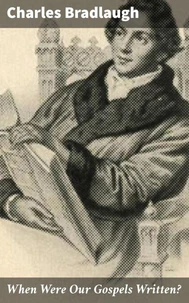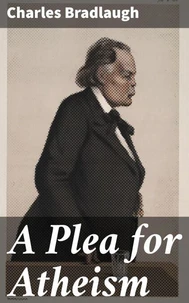The Impeachment of the House of Brunswick
Par :Formats :
Disponible dans votre compte client Decitre ou Furet du Nord dès validation de votre commande. Le format ePub est :
- Compatible avec une lecture sur My Vivlio (smartphone, tablette, ordinateur)
- Compatible avec une lecture sur liseuses Vivlio
- Pour les liseuses autres que Vivlio, vous devez utiliser le logiciel Adobe Digital Edition. Non compatible avec la lecture sur les liseuses Kindle, Remarkable et Sony
 , qui est-ce ?
, qui est-ce ?Notre partenaire de plateforme de lecture numérique où vous retrouverez l'ensemble de vos ebooks gratuitement
Pour en savoir plus sur nos ebooks, consultez notre aide en ligne ici
- Nombre de pages125
- FormatePub
- ISBN859-65--4737093-2
- EAN8596547370932
- Date de parution16/09/2022
- Protection num.Digital Watermarking
- Taille356 Ko
- Infos supplémentairesepub
- ÉditeurDIGICAT
Résumé
In "The Impeachment of the House of Brunswick, " Charles Bradlaugh presents a provocative exploration of political accountability and the limits of monarchical power, focusing on the British royal family during the early 19th century. Utilizing a sharp, incendiary style often characteristic of Bradlaugh's work, this book combines historical narrative with a critical analysis of political ethics. It places the Brunswick family under a metaphorical microscope, questioning their legitimacy and actions in the context of a rapidly changing political landscape, characterized by the rise of democratic sentiments and the growing dissatisfaction with autocratic rule.
Charles Bradlaugh was a prominent political activist, a staunch advocate for atheism, and a radical thinker known for his confrontational style. His experiences in the 19th-century socio-political turbulence-particularly the fight for greater civil liberties and the separation of church and state-shaped his views on monarchy and governance. Bradlaugh's own tumultuous encounters with the legal and political systems lend a distinct urgency to his arguments, as he reveals systemic injustices that threaten democratic values.
This book is essential reading for those interested in the intersection of political philosophy and history. It serves not only as a critique of a specific royal lineage but also as a timeless reminder of the necessity for accountability in governance. Readers who cherish historical analysis intertwined with vibrant rhetoric will find Bradlaugh's work both enlightening and challenging.
Charles Bradlaugh was a prominent political activist, a staunch advocate for atheism, and a radical thinker known for his confrontational style. His experiences in the 19th-century socio-political turbulence-particularly the fight for greater civil liberties and the separation of church and state-shaped his views on monarchy and governance. Bradlaugh's own tumultuous encounters with the legal and political systems lend a distinct urgency to his arguments, as he reveals systemic injustices that threaten democratic values.
This book is essential reading for those interested in the intersection of political philosophy and history. It serves not only as a critique of a specific royal lineage but also as a timeless reminder of the necessity for accountability in governance. Readers who cherish historical analysis intertwined with vibrant rhetoric will find Bradlaugh's work both enlightening and challenging.
In "The Impeachment of the House of Brunswick, " Charles Bradlaugh presents a provocative exploration of political accountability and the limits of monarchical power, focusing on the British royal family during the early 19th century. Utilizing a sharp, incendiary style often characteristic of Bradlaugh's work, this book combines historical narrative with a critical analysis of political ethics. It places the Brunswick family under a metaphorical microscope, questioning their legitimacy and actions in the context of a rapidly changing political landscape, characterized by the rise of democratic sentiments and the growing dissatisfaction with autocratic rule.
Charles Bradlaugh was a prominent political activist, a staunch advocate for atheism, and a radical thinker known for his confrontational style. His experiences in the 19th-century socio-political turbulence-particularly the fight for greater civil liberties and the separation of church and state-shaped his views on monarchy and governance. Bradlaugh's own tumultuous encounters with the legal and political systems lend a distinct urgency to his arguments, as he reveals systemic injustices that threaten democratic values.
This book is essential reading for those interested in the intersection of political philosophy and history. It serves not only as a critique of a specific royal lineage but also as a timeless reminder of the necessity for accountability in governance. Readers who cherish historical analysis intertwined with vibrant rhetoric will find Bradlaugh's work both enlightening and challenging.
Charles Bradlaugh was a prominent political activist, a staunch advocate for atheism, and a radical thinker known for his confrontational style. His experiences in the 19th-century socio-political turbulence-particularly the fight for greater civil liberties and the separation of church and state-shaped his views on monarchy and governance. Bradlaugh's own tumultuous encounters with the legal and political systems lend a distinct urgency to his arguments, as he reveals systemic injustices that threaten democratic values.
This book is essential reading for those interested in the intersection of political philosophy and history. It serves not only as a critique of a specific royal lineage but also as a timeless reminder of the necessity for accountability in governance. Readers who cherish historical analysis intertwined with vibrant rhetoric will find Bradlaugh's work both enlightening and challenging.






